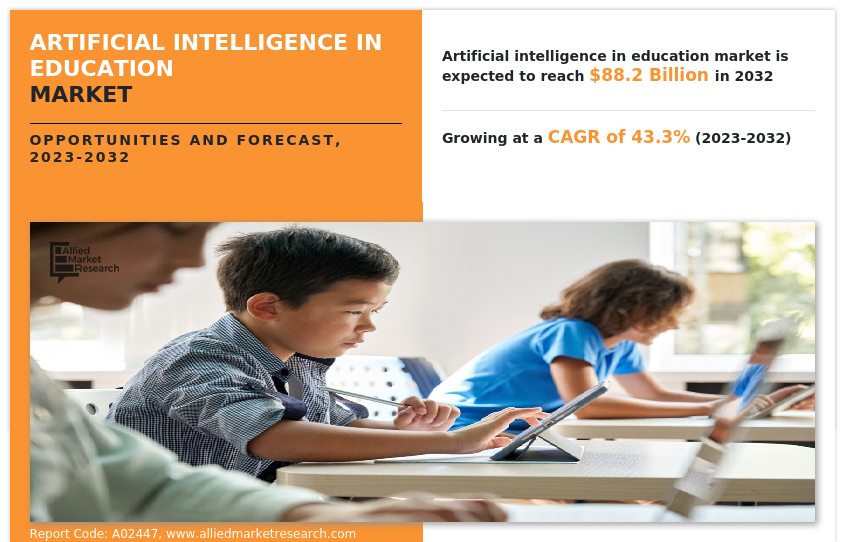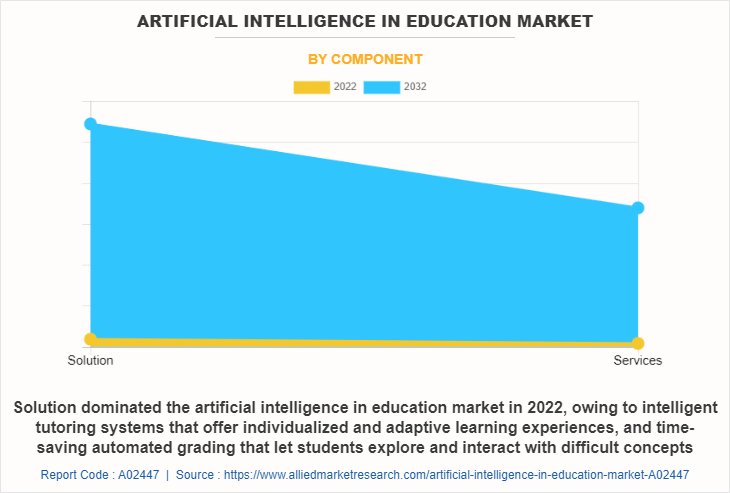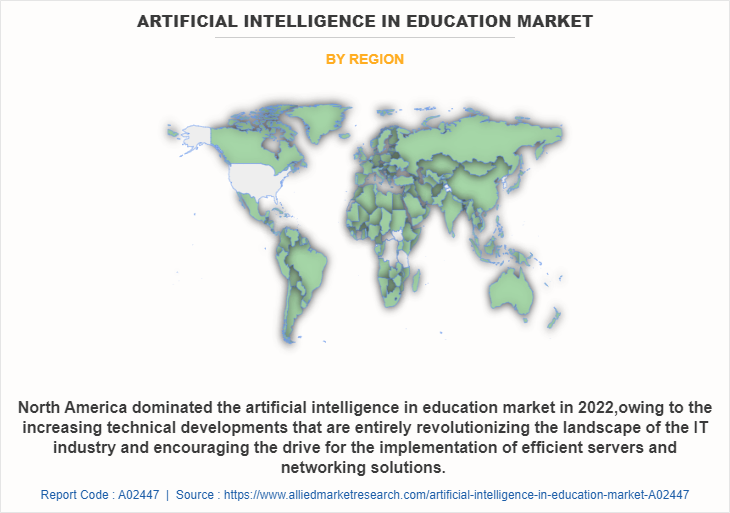AI in Education Market Overview
The global AI in education market was valued at USD 2.5 billion in 2022, and is projected to reach USD 88.2 billion by 2032, growing at a CAGR of 43.3% from 2023 to 2032.
In the market for AI in education, AI-enabled products and services perform a variety of activities, including material distribution, skill assessment, student integration, and adaptive instructional platforms to improve learning for both students and teachers. Software for training and education is increasingly incorporating artificial intelligence (AI) technologies such as deep learning, machine learning, and natural language processing (NLP) to enhance performance and the learning experience. Artificial intelligence (AI) technologies are being integrated in accordance with current educational paradigms to improve educational systems for improved information transmission and evaluation. By reducing costs, boosting administrative effectiveness, and enhancing IT security on campuses by identifying threats sooner and taking prompt action, the introduction of AI into the education sector has benefited educational institutions significantly.

Moreover, technological advancements have generated business opportunities in the entertainment sector and paved the way for innovation, business models, and new services. The rise in the number of smart education projects, followed by an increase in concerns for customized experience are a few other factors that propel demand for AI in education systems. In addition, the rise in the adoption of management systems considerably makes education more efficient, and more sustainable by employing numerous information and communication technologies for many modes of education.
Furthermore, personalized education and adaptive learning, virtual assistants and smart tutoring and improvements in administrative efficiency are primarily driving the growth of AI in education market. However, privacy and ethical issues and access issues and equity concerns hamper the market growth to some extent. Moreover, enhanced motivation and engagement of students and data-driven decision making are expected to provide lucrative opportunities for market growth during the forecast period.
Segment Overview
The AI in education market is segmented into Application, End User, Component, Deployment Mode, and Technology. On the basis of component, it is segregated into solution and services. On the basis of deployment mode, it is segregated into on-premise and cloud. On the basis of technology in the ai in education market, it is segregated into machine learning and deep learning, and natural language processing (NLP). On the basis of application, it is segregated into learning platform and virtual facilitators, smart content delivery, fraud and risk management, intelligent tutoring system (ITS), and others. On the basis of end user, it is segregated into higher learning, corporate learning, K-12 education, and others. On the basis of region, it is analyzed across North America, Europe, Asia-Pacific, and LAMEA.

On the basis of component, solution segment dominated the artificial intelligence (AI) in education market in 2022, and is expected to maintain its dominance in the upcoming years, owing to the rising usage and development of artificial intelligence technologies in the educational sector propels. However, service segment is expected segment is expected to witness highest growth, owing to gain knowledge about learning patterns, instructional efficacy, and student outcomes, these platforms gather and analyze enormous volumes of educational data, including student performance, engagement, and behavior.

On the basis of region, North America region dominated the artificial intelligence in education market share in 2022, and is expected to maintain its dominance in the upcoming years, owing to the increasing technical developments that are entirely revolutionizing the landscape of the IT industry and encouraging the drive for the implementation of efficient servers and networking solutions. However, Asia Pacific region is expected segment is expected to witness highest growth, owing to increase the efficacy and quality of education offered by AI in education industry has increased due to the sizeable population and growing emphasis on education in Asia-Pacific.
Top Impacting Factors
Personalized Education and Adaptive Learning
The requirement for adaptive and personalized learning is a key factor driving AI in the education sector. To provide personalized learning experiences for specific students, AI systems can analyze enormous volumes of data, including student performance, learning preferences, and learning styles. Students can learn at their own pace, concentrate on areas where they need to improve, and explore more complex ideas when they are ready due to personalized learning. The content, tempo, and delivery of education may all be customized using AI algorithms to fit the unique needs of each learner.
Moreover, this encourages participation, drive, and a deeper comprehension of the material, which eventually improves learning results. Continual adaptation and optimization of the learning experience based on real-time data constitute adaptive education, which goes beyond personalized learning. Artificial intelligence-powered adaptive systems can dynamically change the difficulty and order of the content, deliver immediate feedback, and provide extra resources or help as needed. By using an adaptable approach, teachers can make sure that students are suitably challenged and that they get the help they need when they run into problems.
Virtual Assistants and Smart Tutoring
The creation of intelligent tutoring platforms and virtual assistants is another driver AI in education market. These AI-powered tools serve as individualized tutors, offering advice and help to pupils on an as-needed basis. AI algorithms are used by intelligent tutoring systems to comprehend students' strengths and limitations, spot misconceptions, and deliver specialized education and feedback. Based on the student's success, they can adjust the learning pace and content, resulting in a more efficient and interesting learning process.
Virtual assistants use conversational AI and natural language processing to give students rapid access to knowledge and direction. They are able to respond to queries, clarify ideas, and offer other resources. Learning may be made easier by integrating these virtual assistants into learning management systems, internet platforms, and even physical gadgets, which is a major attracting factor for students nowadays.
Key Market Players
AI in education key players such as Microsoft Corporation, International Business Machines Corporation, Amazon Web Services, Inc., Google llc, Cognizant, Dreambox Learning, Inc., Bridgeu, Carnegie Learning, Inc., Pearson Plc, Nuance Communications, Inc. These major players have adopted various key development strategies such as business expansion, new product launches, and partnerships, which help to drive the growth of the AI in education industry globally.
Regional Insights
North America dominates the AI in Education market, driven by significant investments in educational technology and strong governmental support for AI integration into the education system. The U.S., in particular, leads the region, with educational institutions adopting AI-powered tools for personalized learning, grading, and administrative functions. The growing focus on online learning platforms and smart classrooms, accelerated by the pandemic, has boosted AI adoption in schools and universities across North America.
Europe follows closely behind, with countries like the UK, Germany, and France investing heavily in AI-based education technologies. The European Union's focus on digital education through initiatives like the Digital Education Action Plan (2021-2027) promotes the development and implementation of AI tools in the region's schools. AI is being used to bridge learning gaps, automate administrative tasks, and provide multilingual support for diverse student populations.
Asia-Pacific is the fastest-growing region, driven by increasing investments in educational infrastructure and the rapid digitalization of education. Countries such as China, India, and Japan are at the forefront of AI adoption in the education sector. China, in particular, has made AI education a national priority, incorporating AI tools into its curriculum and investing heavily in ed-tech startups. In India, AI-powered learning platforms are gaining popularity, especially in the K-12 segment, where personalized learning solutions are improving student engagement and performance. The region’s large student population and government-backed initiatives for digital literacy are key drivers of AI in education.
Key Industry Developments
In July 2023, Google announced a collaboration with leading universities in North America to expand its AI Tutor initiative, which uses AI to offer personalized tutoring for students across various subjects. The platform is designed to provide tailored learning experiences, enhancing the effectiveness of online education.
In August 2023, Microsoft launched its AI-powered Classroom Insights in Europe, a tool integrated into its popular learning management system (LMS), which helps educators track student progress and personalize lesson plans using real-time data and AI algorithms. This development aims to improve classroom management and student engagement through data-driven insights.
In September 2023, Alibaba Cloud introduced its AI-driven Adaptive Learning Platform in China, designed to provide real-time feedback to students and adjust learning materials based on individual performance. This innovation is being adopted across many educational institutions to promote personalized and interactive learning experiences.
Key Benefits for Stakeholders
This report provides a quantitative analysis of the market segments, current trends, estimations, and dynamics of the AI in education market analysis from 2022 to 2032 to identify the prevailing artificial intelligence in education market opportunities.
The AI in education market research is offered along with information related to key drivers, restraints, and opportunities.
Porter's five forces analysis highlights the potency of buyers and suppliers to enable stakeholders make profit-oriented business decisions and strengthen their supplier-buyer network.
In-depth analysis of the AI in education market forecast assists to determine the prevailing market opportunities and AI in education market size.
Major countries in each region are mapped according to their revenue contribution to the global market of artificial intelligence in education industry.
Market player positioning facilitates benchmarking and provides a clear understanding of the present position of the market players of AI in education industry.
The report includes the analysis of the regional as well as global AI in education market trends, key players, market segments, application areas, and AI in education market growth strategies.
Artificial Intelligence in Education Market Report Highlights
| Aspects | Details |
| Market Size By 2032 | USD 88.2 billion |
| Growth Rate | CAGR of 43.3% |
| Forecast period | 2022 - 2032 |
| Report Pages | 343 |
| By Application |
|
| By End User |
|
| By Component |
|
| By Deployment Mode |
|
| By Technology |
|
| By Region |
|
| Key Market Players | Carnegie Learning, Inc., Microsoft Corporation, Pearson PLC, International Business Machines Corporation, Nuance Communications, Inc., DreamBox Learning, Inc., Cognizant, Amazon Web Services, Inc., Google LLC, BridgeU |
Analyst Review
The market for AI in education is expected to expand as a result of rising investments in AI technology. The development of AI technology is being led by business titans and digital natives like Google, Microsoft, and Facebook, among others. Together, companies are spending billions on a variety of artificial intelligence (AI) applications, such as computer vision, natural language processing, robots, machine learning, virtual assistants, and driverless cars. The majority of money spent on R&D for AI is spent internally by technology companies to advance the technology. Additionally, these companies are increasing their investments in educational start-ups such as Byju's, which is assisting in the market's explosive growth.
A growing number of public and private sector investments in AI and EdTech, as well as growing edutainment acceptability, are driving the demand for artificial intelligence (AI) in education. Technological advancement is also fueling the demand for AI in education internationally. Furthermore, investment in AI by IT companies like Google, Microsoft, IBM, and AWS is the main factor driving market demand. The increasing investments in technology are credited with driving the development of sophisticated analytics, machine learning, and cognitive solutions as well as the numerous applications of AI technology. The majority of investments in AI are made by technology companies at the corporate level to advance R&D efforts. In order to acquire clients, technology, and qualified staff, technology behemoths are also concentrating on strategic acquisitions of AI-based start-ups. Since more people are using mobile devices, such as smartphones, tablets, and PCs, to access educational programs and study materials, software developers are now required to provide software that is compatible with these gadgets.
For instance, in May 2020, Jenzabar, Inc., a technology innovator for higher education, announced the launch of the Jenzabar Unity platform to improve operational efficiency and reduce technical barriers associated across campus with the help of iPaas integration.
The global artificial intelligence in education market was valued at USD 2.5 billion in 2022, and is projected to reach USD 88.2 billion by 2032,
The global artificial intelligence in education market is projected to grow at a compound annual growth rate of 43.3% from 2022 - 2032 to reach USD 88.2 billion by 2032
Microsoft Corporation, International Business Machines Corporation, Amazon Web Services, Inc., Google llc, Cognizant, Dreambox Learning, Inc., Bridgeu, Carnegie Learning, Inc., Pearson Plc, Nuance Communications, Inc. are the top companies to hold the market share in Artificial Intelligence in Education
North America is the largest regional market for Artificial Intelligence in Education.
The key factors driving the Artificial Intelligence in Education market are personalized learning, automation of administrative tasks, growing EdTech investments, and increasing demand for smart content and adaptive learning platforms.
Loading Table Of Content...
Loading Research Methodology...



